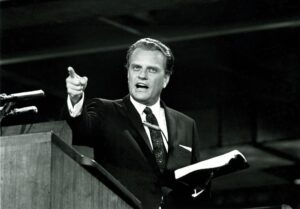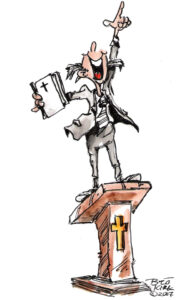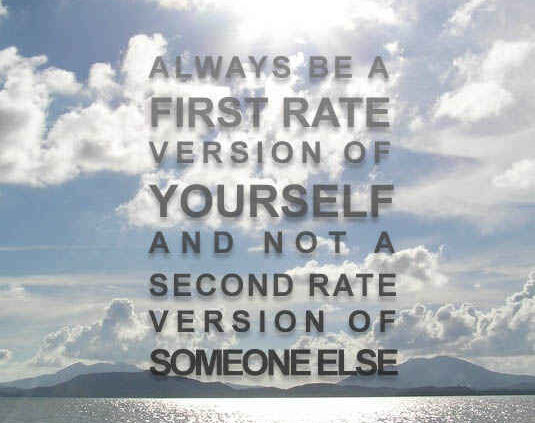The Importance of Being Yourself When You Preach
The Importance of Being Yourself When You Preach
This post is about the importance of being yourself when you preach to a congregation.
 One of the most engaging preachers in my geographical area became a professor of preaching. He was an effective preacher, with some impressive approaches to commuication. For one, he memorized the passages he was going to present, and proceeded to say them from memory. He always wore a bowtie to preach–not for any particular reason, except that was just his style. And he preached with no notes, and like to wander away from the pulpits in the churches where he preached. I have a friend who was in one of his introductory classes of preaching. One of the things that my friend noted was that other classmates began memorizing Scripture passages, and many of the men wore bowties to preach as well. Almost everyone from that class preached with no notes. In other words, the professor produced a bunch of clones.
One of the most engaging preachers in my geographical area became a professor of preaching. He was an effective preacher, with some impressive approaches to commuication. For one, he memorized the passages he was going to present, and proceeded to say them from memory. He always wore a bowtie to preach–not for any particular reason, except that was just his style. And he preached with no notes, and like to wander away from the pulpits in the churches where he preached. I have a friend who was in one of his introductory classes of preaching. One of the things that my friend noted was that other classmates began memorizing Scripture passages, and many of the men wore bowties to preach as well. Almost everyone from that class preached with no notes. In other words, the professor produced a bunch of clones.
We Are Not Intended to Be Clones
Earlier in this blog we looked at the preacher’s identity for several posts. All of those things I wrote earlier I believe to be true. However, one identity aspect that you need to come to understand is the importance of being yourself when you preach to people.

Billy Graham preaching
I know there is a great temptation to mimic a very popular and effective preacher. One of my professors, Peter Wagner, told about going to Bolivia as a missionary. He decided that he was going to be the Bolivian Billy Graham. So he watched videos of Graham, carefully noting the gestures he used and the cadence of his speech. He went so far as to memorize some of Graham’s sermons and translated them. Then he rented a large auditorium, put up posters, made radio spots, and prepared for people to come. Only a few people showed up. So he did a re-evaluation of his life and calling, and ended up teaching missions and church growth.
How To Be Yourself When You Preach
 One of the books I’m reading right now is Preaching Nuts and Bolts, by Brandon Hilgemann. He compares this tendency to imitate to purchasing a pair of knock-off Oakley sunglasses. They looked almost genuine when he purchased them, but they fell apart within a month of purchase. He says, reflecting on his pair of Oakleys, “I tell you this cautionary tale, because I fear that too many pastors settle for cheap imitation preaching.”
One of the books I’m reading right now is Preaching Nuts and Bolts, by Brandon Hilgemann. He compares this tendency to imitate to purchasing a pair of knock-off Oakley sunglasses. They looked almost genuine when he purchased them, but they fell apart within a month of purchase. He says, reflecting on his pair of Oakleys, “I tell you this cautionary tale, because I fear that too many pastors settle for cheap imitation preaching.”
So, how do you develop your own voice, your own style? Here are some tips that I have found helpful.
Learn From Many Skilled Preachers
While I lived in Southern California, we had a seminary intern who was with us for a year to learn more about ministry. I gave him an assignment to go to several of the well-known preachers in our area, and be ready to discuss what made those speakers impactful. So he went to or listened on-line to people like Rick Warren, Fred Price, John MacArthur, Francis Chan, Robert Schuller, Jack Hayford, etc. Then we talked down what made them effective communicators of the gospel. We talked about the importance of being yourself when you preach to people, but to learn from those who do it well. Learn principles.
Develop Your Own Style
 Once you have learned from excellent communicators (and continue to do so your entire ministry), try out what you have learned. Experiment with styles that will borrow from others in small ways, but are uniquely your own.
Once you have learned from excellent communicators (and continue to do so your entire ministry), try out what you have learned. Experiment with styles that will borrow from others in small ways, but are uniquely your own.
For instance, you may notice the way good preachers use their voice. Try it! I love the way EV Hill used to begin his sermon down low in volume and intensity, but then build to a climax at the end of a message. I couldn’t do it nearly as well as he did, but every once in a while I will adapt his style into a sermon.
Or you may note a particularly effective gesture that a preacher uses. Learn from it, and adapt it to meet your style.
One preacher may use powerpoint with great effect. Learn from that. Adapt it to meet your style.
The bottom line is this: don’t just be a clone. Rather use what you see is effective from many different styles to become the unique you that God created. Then you will understand the importance of being yourself when you preach the gospel.
Here is another voice on this subject. Dr. Eugene Gibson Sr. reflects on finding his own voice as a preacher and gives some good tips on how to develop yours.



